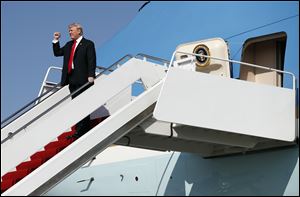
EDITORIAL
The Trump Christmas gift
12/23/2017

President Donald Trump gestures to a cheering crowd on the tarmac as he arrives on Air Force One at Palm Beach International Airport, in West Palm Beach, Fla., on Friday, Dec. 22.
There are three key questions to ask about the massive tax cuts the Republicans in Congress, very much led by President Donald Trump, have just passed:
BEHIND THE EDITORIAL: Keith Burris and Wynne Everett discuss the GOP tax bill
1.) Will they work? That is, will they put a significant amount of cash into the paychecks and pocketbooks of citizens of this land? Will that even further energize the total economy? And will this happen fast?
2.) Will the economic benefit of the tax cuts offset what the cuts add to the national debt? The debt is now $20 trillion and the cuts will add another trillion next year and roughly $5.5 trillion more over the next decade — real money.
3.) If the tax cuts work, work quickly, and generate enough growth to offset some of the added debt, will the GOP and Mr. Trump benefit politically?
Many people say they know the answer to these questions but, in truth, no one does, not pollsters, not economists, and not Beltway prognosticators or soothsayers.
It’s strange that the President’s poll numbers — he is at about 38 percent approval — have not moved in spite of this big win, for the President, and, he says, the public. Other polling shows that much of the public is skeptical about tax reform and many are outright dubious. They just don’t believe the new tax code is what they are told it is.
Yet the Republican tax-reform package really does lower rates for the vast majority of taxpayers, across all the tax brackets, so after-tax incomes will rise for most of us, at least somewhat, and almost immediately.
The President seems to have settled his political identity, at least for the moment — he will be a tax cutting, regulation eliminating, Reagan Republican. This has united his party, at least for the moment. But both the party and the President have failed to make the sale to the general public. What gives?
Well, what do we know from past history?
We know from the Reagan years that cutting taxes and the size of government does result in political capital — in due course.
We also know that economic growth does not outrun, or completely offset, accumulated national debt. It helps. The Reagan tax cuts made it easier for Bill Clinton to balance the books. But Mr. Clinton still had to increase tax revenues in various ways to to reduce the debt.
We know, finally, that Mr. Trump is not Ronald Reagan. Mr. Reagan was dignified and likable. It’s possible that Mr. Trump’s low standing in the polls is the result of two things: Unrelentingly negative national press coverage and his own trivialization of his presidency. Mr. Trump’s political triumphs tend to be obscured not only by Trump hate, but the distractions he creates. He often spoils his own party. If he does not do something to distract from his first and very substantial legislative victory, it will be a first.
Click here to view more Blade editorials
There is something else at work. American voters are great equalizers: They sent Mr. Clinton and Barack Obama big wake-up calls in 1994 and 2010 and gave Republicans big congressional victories. The American voter likes to recalibrate and he rather likes divided government. Republicans could be headed toward a loss of Congress in 2018, no matter what they do right.
Still, Bill Clinton and Barack Obama were re-elected after their midterm comeuppances. The polls may say 38 percent now, but if the economy is still humming, or even better than it is now in 2020, (suppose some of those manufacturing jobs Mr. Trump promised begin to materialize), people may vote their pocketbooks in the next presidential contest. It’s still “the economy, stupid,” that drives the big race, though perhaps this is more true when the economy is collapsing than when it is bubbling.